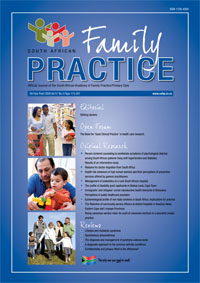Healthy lifestyle interventions in general practice. Part 6: Lifestyle and Metabolic Syndrome
Keywords:
Healthy lifestyle interventions, Lifestyle and Metabolic Syndrome
Abstract
Although there is no clarity on the precise definition of the metabolic syndrome, there is consensus that it is a cluster of inter-related risk factors (elevated blood pressure, elevated plasma glucose, atherogenic dyslipidaemia) that are due to mainly abdominal obesity and insulin resistance, and which appear to directly promote the development of atherosclerotic cardiovascular disease (ASCVD), and increase the risk for developing type 2 diabetes mellitus. The prevalence of the metabolic syndrome is increasing globally, including in the adolescent population. In developed countries the prevalence of the metabolic syndrome is about 30% of the adult population. The cornerstone of management of this syndrome is lifestyle intervention. Following a comprehensive initial assessment to risk-stratify patients, they are recommended to attend either a group-based program (medically supervised or medically directed, depending on the severity of the disease and the presence of any co-morbidities) or a home-based intervention program. The main elements of a lifestyle intervention program for metabolic syndrome are nutritional intervention (mainly for weight loss and to improve the atherogenic dyslipidaemia), exercise training (minimum of 30-60 minutes at moderate intensity on most days of the week), and psychosocial interventions. Regular monitoring should be conducted and a follow-up assessment is indicated after 3 months to assess progress and to re-set goals. Longer-term (5-6 months) and supervised intervention programs are associated with better long-term outcomes.
Section
CPD
By submitting manuscripts to SAFP, authors of original articles are assigning copyright to the South African Academy of Family Physicians. Copyright of review articles are assigned to the Publisher, Medpharm Publications (Pty) Ltd, unless otherwise specified. Authors may use their own work after publication without written permission, provided they acknowledge the original source. Individuals and academic institutions may freely copy and distribute articles published in SAFP for educational and research purposes without obtaining permission.

